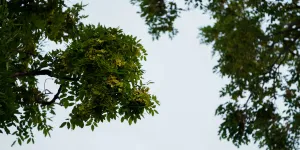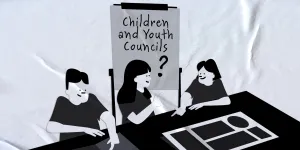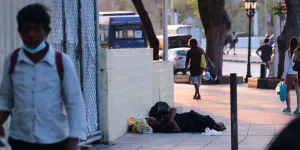By Chutikan Chaikittiwatana |
The Empowerment of Persons With Disabilities Act, which contains sections on the employment of persons with disabilities, has been in effect in Thailand since 2007. However, people with disabilities continue to face significant obstacles in every stage of the employment process, from job searching to receiving interview opportunities and fair working conditions.
By Wanna Taemthong |
Since the 2021 military coup in Myanmar, people from all walks of life have had to leave the country for opposing the coup. Many are seeking refuge in Thailand, including Shwe, a violinist who participated in an anti-coup performance and fled Yangon following a police raid on his family's apartment building, and San Jay, a former government worker-turned-rapper who joined the Civil Disobedience Movement after the coup.
By Chutikan Chaikittiwatana |
In mid-August 2020, at the height of the student-led pro-democracy protests, Thai high school students began protesting by displaying the three-finger salute during the the playing of the national anthem at their morning assembly while wearing white bows as symbols of resistance to dictatorship.
Despite its familiarity in daily Thai life, few are aware of the anthem’s origins, which trace back to the 1932 Siamese revolution that transformed the country into a constitutional monarchy, and as the definition of the nation become contested, the anthem becomes an arena hosting differing definitions among factions of Thais.
By Kamonchanok Rueankham |
Thai women leaders in local politics have been working relentlessly to combat gender stereotypes and to become living examples for future generations.
By Lanner Burma |
When Songkran arrives, people in Thailand flock to buy bus and train tickets to return to their hometowns. In Myanmar, this mid-April holiday, celebrated all over mainland Southeast Asia, is called Thingyan. However, the festivities have been disrupted for the past four years, both by the Covid-19 pandemic and by the military coup in 2021 which led to a military dictatorship and an ongoing civil war. Many people are now seeking refuge in Thailand and are no longer safe to return home.
By Atitaya Phoemphon |
Established under the National Child and Youth Development Promotion Act of 2007, Children and Youth Councils let local authorities budget and make development plans for young people around the country. However, as council activities have mostly been determined by adults and state authorities, they have yet to receive much interest from their target stakeholders, Thai youth.
By Patrice Victor |
Although the Rohingya people were initially welcomed to seek asylum in Malaysia, they are now facing discrimination and xenophobia as a climate of uncertainty and anxiety spread through the Malaysian population during the Covid-19 pandemic. Anti-rohingya rhetoric emerged on social media along with some demonstrations by the locals, while the once-supportive government turned against them.
By Atthaphon Sichitsanuwaranon |
Under the 2007 Empowerment of Persons Disability Act, each holder of a Disability Card is entitled to receive 40,000 baht from the government for home renovation. But in the country's rural areas, like Surin's Rattanaburi and Kap Choeng districts, people are having issues accessing their welfare. Families who do not have the land deed to their houses are not paid for renovation, while others may have to wait at least 3 months for the budget to be approved.
By Patrice Victor |
Last May, the Malaysian police seized 172 rainbow watches from 11 Swatch shops across the country. The Malaysian Home Minister said that the brand's Pride collection are "detrimental to morality" and threatened anyone caught wearing one of the watches with fine and jail time. Although noone has yet to be jailed for wearing rainbow and a variety of gay venues in Kuala Lumpur, LGBTQ people are facing more repression due to rising Islamic fundamentalism.
By Samanachan Buddhajak and Donlawat Sunsuk |
Due to unseasonal water level fluctuation in the Mekong River, a result of upstream dams, many species of migratory birds that use to lay eggs along the riverbank in Bueng Kan City are disappearing. Meanwhile, tourism and riverbank development is also causing traditional lifestyles and natural habitats to disappear.
By Sasitorn Aksornwilai |
In the vibrant and bustling centre of Bangkok, PM 2.5 readings are soaring to hazardous levels. The city’s most vulnerable residents, the homeless, are left exposed. Living their lives on the streets, their already precarious health is exacerbated by the pollution. Despite promises of action to control pollution, the air quality crisis shows no sign of abating.
By Wanaree Srisari |
People without a home and people without a place of shelter in Khon Kaen – many have to live lives in the public park surrounding Bueng Kaen Nakhon reservoir. Besides mutual encouragement among the homeless to resolve to fight for a life, Ban Home Saen Suk (Khon Kaen Homeless Commune) is a shelter that helps revive the potential of its members to get established to the point that they don’t have to go back to being homeless.












